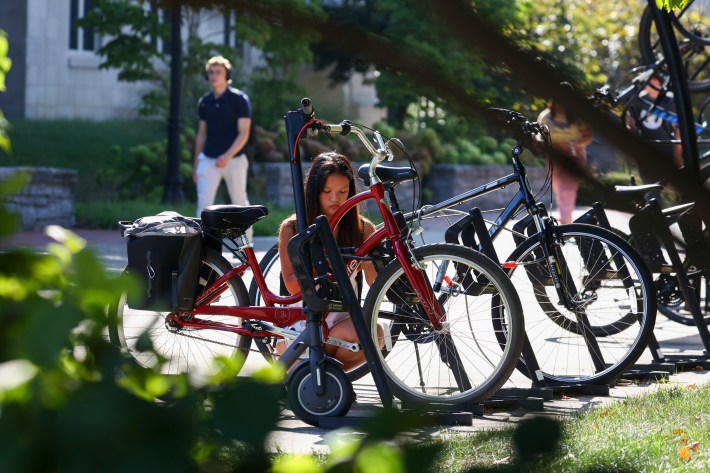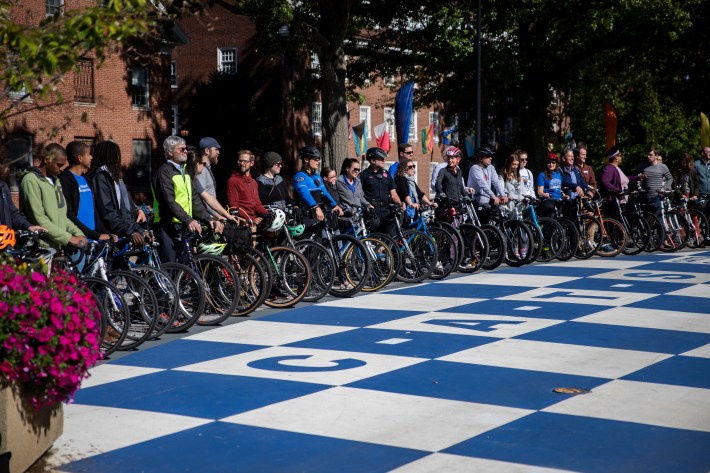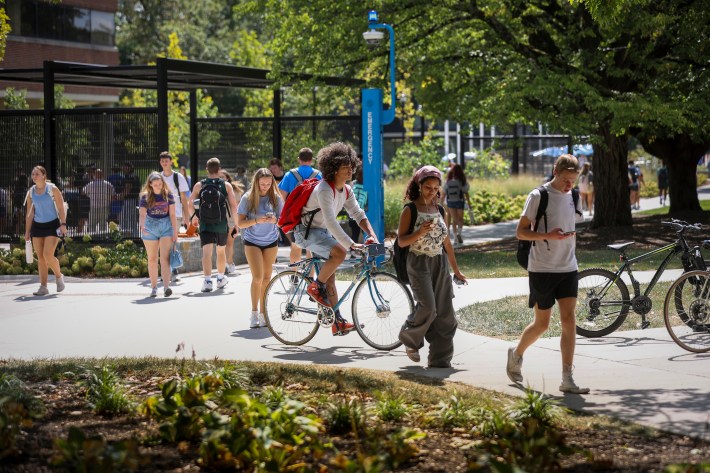Bike-Friendly Campuses Can Inspire the Rest of Car-Centric America
Forty more years!
Millions of Americans spend four years at a residential college where they happily walk or roll to class every day — only to abandon those active transportation habits as soon as they have their diploma in hand and a job offer at a car-dependent business across town. But what if these collegiate havens for non-automotive transportation could serve as a model for the cities to which their graduates will eventually move, not to mention other higher-ed institutions that aren’t quite so bike/walk friendly?
That’s the conversation that the organizers of the National Campus Bike Summit are hoping to start when they gather in Lexington on Oct. 17 and 18. The first-of-its-kind event will bring together sustainable transportation advocates from across the country to talk about what makes a college or university hospitable to people on two wheels — and how campuses can help catalyze broader change in America’s transportation culture.
“There are lots of summits that look at bicycling from different angles, but there really hasn’t been one that’s focused on campuses,” said Sandra Broadwill, alternative transportation manager for the University of Kentucky, which is hosting the event. “[We want to explore]: how can we better integrate with the cities and communities that we’re a part of? But also, how can we make the campus a bigger player on the national stage?”

Contrary to the idyllic cliche of co-eds strolling and rolling through car-free quads, Broadwill says the bike-friendly college campus is a surprisingly rare breed in America. A whopping 85 percent of U.S. students today commute to campus — a share that may have increased since the explosion of remote learning during the pandemic. Many universities don’t even offer dorms, or struggle to supply beds to everyone who needs them, nevermind helping their faculty and staff access housing nearby.
At large commuter universities in cities with poor public transit, Broadwill says students are more likely to encounter “fields and fields of parking” than a dense grid of campus buildings that put all of students’ needs within easy rolling distance. And many schools fall somewhere between the two extremes, whether because they operate a urban campus that’s criss-crossed by dangerous public roads, or because their walkable college bubble ends abruptly where an adjacent, car-dominated city begins.
When campuses get bike-friendliness right, though, they can serve as prototypes for what every city could be if we treated our places like true communities for people.
“In the idealized version of a campus, everywhere is very close and safe,” she added. “And so it does feel really easy to walk and bike everywhere that you need to go, and all of your needs are met in a in a tight-knit location. … The closer together the buildings, and the safer the streets feel, the more likely that people are to spend more time on the campus, to engage more with campus activities, to make more friends. It creates an environment where people feel a great sense of place.”

At the Summit, Broadwill says panelists will zero in on the structural ingredients that can make that idealized vision real, and the challenges and opportunities campuses might encounter along the way.
One session will tackle the unique process of funding bike transportation in a campus context, which might pull dollars from a fragmented array of departments including transportation, sustainability, student recreation, health, and more. Another panel will tackle how state and local transportation officials select which projects to pursue — many of which have a direct impact on college communities, especially when public roads run through or connect to campuses directly.
In rare cases, like the University of Kentucky’s famous 2018 “land swap” with the city of Lexington, universities are even able to gain ownership of roads within their campus borders, which allows to add bike lanes, raised crosswalks and even pedestrian plazas.
“Something that we’re constantly working on at the University of Kentucky is to try and make our connections to the downtown area more bicycle friendly and more walkable,” she said. “And that’s a 100-year battle, but we make progress every year.”
Another panel will offer a deep dive into campus bike shares and shops, including UK’s own Wildcat Wheels, which guarantees 150 students the use of a bike for a whole year if they sign a pledge not to bring a car to campus. Hundreds of other bikes are available for shorter-term use; students can even check out one that’s capable of powering a handlebar-mounted smoothie blender.
“Our hope is always that if a student checks out a bike from Wildcat Wheels, and they use it for the whole semester and they love it, they’ll eventually buy a bike for their own to keep,” Broadwill says. “Because then, we’ve got them.”

Broadwill acknowledges that not all of the tools to create bike-friendly campuses are portable to bike-friendly cities.
Charging steep parking fees or issuing $500 bike vouchers can be easier to do in the context of a school budget than it it is in a diverse city full of taxpayers with diverse opinions. And it’s certainly simpler to master-plan a walkable school community than it is to retrofit one from a car-dependent town where residents have direct and permanent stake in their streets, and resource-intensive community engagement is required by law.
“One of the unique things about a campus setting versus trying to make these changes in a city is that we don’t have to answer to this the citizens of the city,” Broadwill adds. “Of course the campus community has has input into everything that we do, but it’s not quite the same as pushing up against a citizen who doesn’t want a bike lane in front of their house, or a business that doesn’t want bike parking in front of their business.”
Still, Broadwill hopes that the National Campus Bike Summit can spark conversations about how higher ed can influence transportation outcomes beyond campus borders, and far into students’ commuting futures, too. That could like incorporating bikes into urban planning and engineering curricula to teach students about how cities work for people on two wheels — or just showing them how great cycling can be when they live in a place that was explicitly built for it.
“It’s about more than just owning a bicycle, obviously,” Broadwill adds. “Tons of students bring a bike to campus because their parents told them to, and then it just rusts at the bike rack and never gets used at all … I think it’s more about creating a culture of bicycling — being able to catch those students and engage them with fun events that make them think that bicycling is a cool thing to do, and not just a way to get from point A to point B.”
source https://usa.streetsblog.org/2024/10/10/bike-friendly-campuses-can-inspire-the-rest-of-car-centric-america

Comments
Post a Comment